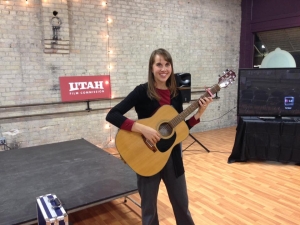
Over the past two decades, the exponential growth in research on substance use disorders (e.g. alcoholism, drug addiction) and process addictions (e.g. sex addiction, porn addiction, eating disorders, offending behaviors, etc.), as well as trauma, has encouraged clinicians to consider additional therapeutic interventions supportive of tapping into the brain’s neuroplasticity, for changing behaviors. Professionals are eager to find evidence based and research driven therapies, which invite and anchor healthy change. Paradise Creek Recovery Center (PCRC), a residential program for men with sex or porn addiction, offending behaviors or individuals on spectrum with problem sexual behaviors, has found a useful tool toward this goal by utilizing Music Therapy as one of the many helpful interventions.
There is growing body of research showing the benefits of the therapeutic integration of music. There are numerous TEDx talks sharing this research such as: Your Brain is Better on Music | Alex Doman | TEDx Ogden. He discusses his 25 years of research on music and its therapeutic benefits. Mr. Doman helps viewers to explore how as human’s we are “wired” for music’s positive effects of enhancing learning, emotion regulation, stress reduction, reducing depression and suicide, improving sleep, and many more…all by “engaging the whole of our brain.” - which music uniquely does.
Music therapy engages those areas of the brain supportive of positive change. It is invitational - individuals quickly realize participation in a rhythm, a tone or a lyric is experiential and fun, providing the participant to consider their particular experience of the session or sessions. The American Music Therapy Association® governs the professional standards of music therapy practice as “the clinical and evidence-based use of music interventions to address physical, emotional, cognitive and social needs” of those served. It encourages clinicians in music therapy practice to participate and present research, supporting ongoing education of the mental health and medical communities at large. For more in depth information and useful research involving the use of music therapy as an approach on a broad range of behavioral and medical issues, please see the American Music Therapy Association® website.
 Since November of 2016, Heather Overly, SCMT, CBMT, has been the therapist providing music therapy for men at Paradise Creek Recovery Center. Heather meets weekly with PCRC men for a 90-minute group. She described the following benefits she sees in applying music therapy in treatment for sex and porn addiction, offending behaviors and those clients on the autism spectrum with problem sexual behaviors. “I see them internalizing and improving their motivation for recovery. Treatment for sex addiction is often externally motivated - music therapy can support the client’s ownership of why they are in treatment.” Music is also a way to safely experience emotional release, “music does it without words, but allows them to process with words as well.” Music therapy supports group cohesion and inclusivity with the emphasis of group strength - each understanding they’ve become a part of a greater whole. The client's stress and anxiety is reduced with music relaxation and movement exercises. Lyric analysis affords each participant to assign their own meaning, encouraging insight, self-awareness and self-reflection. Music therapy becomes a portable tool and coping skill, as they learn to play, express emotion, and self-sooth anger and anxiety. The participants also become more mindful of music they listen to. “We encourage them to develop a resiliency playlist. They become more aware of how music affects them. We see them discard a song and choose one more supportive of their recovery - that really makes me really happy.”
Since November of 2016, Heather Overly, SCMT, CBMT, has been the therapist providing music therapy for men at Paradise Creek Recovery Center. Heather meets weekly with PCRC men for a 90-minute group. She described the following benefits she sees in applying music therapy in treatment for sex and porn addiction, offending behaviors and those clients on the autism spectrum with problem sexual behaviors. “I see them internalizing and improving their motivation for recovery. Treatment for sex addiction is often externally motivated - music therapy can support the client’s ownership of why they are in treatment.” Music is also a way to safely experience emotional release, “music does it without words, but allows them to process with words as well.” Music therapy supports group cohesion and inclusivity with the emphasis of group strength - each understanding they’ve become a part of a greater whole. The client's stress and anxiety is reduced with music relaxation and movement exercises. Lyric analysis affords each participant to assign their own meaning, encouraging insight, self-awareness and self-reflection. Music therapy becomes a portable tool and coping skill, as they learn to play, express emotion, and self-sooth anger and anxiety. The participants also become more mindful of music they listen to. “We encourage them to develop a resiliency playlist. They become more aware of how music affects them. We see them discard a song and choose one more supportive of their recovery - that really makes me really happy.”
The first music therapy assignment is the act of creating a positive affirmation chant, a unique way to set personal goals during their first week of treatment. Heather provides an easy to use template to start. The clients will then engage in writing their own chant the following week. This process continues throughout their treatment experience - with all of their music and lyrics being saved. During the last music therapy session, near treatment is completion, they share their first chant, followed by their most recent chant, and compare the two. “I often hear the comment, “I was so shallow.” Music therapy is only one of the current therapies helping each client have an overall great experience at PCRC. “I find the music therapy really brings the guys together in a shared experience as they write the lyrics - it becomes the concrete representation of their teamwork and shared trust, while acknowledging each participants contribution.” The overall experience of the process is carried together, both in and outside of therapy, as well as in individual and group sessions.
 Ms. Overly found her passion while in school at Utah State University, achieving her BS in Music Therapy in 2001. “I learned about music therapy with older adults and had the opportunity to observe and learn how music therapy engages participants.” She has practiced utilizing drumming, music improvisation, song writing, lyric analysis, and client sharing meaningful songs with the group. “I love being able to see client responses and witness those special moments.” Review of research was valuable in shaping her approach and focus in music therapy, she says, seeing the evidence of positive change in motivation, social skills, self-awareness, emotion expression and regulation made an impact on her choice to pursue music therapy as a career.
Ms. Overly found her passion while in school at Utah State University, achieving her BS in Music Therapy in 2001. “I learned about music therapy with older adults and had the opportunity to observe and learn how music therapy engages participants.” She has practiced utilizing drumming, music improvisation, song writing, lyric analysis, and client sharing meaningful songs with the group. “I love being able to see client responses and witness those special moments.” Review of research was valuable in shaping her approach and focus in music therapy, she says, seeing the evidence of positive change in motivation, social skills, self-awareness, emotion expression and regulation made an impact on her choice to pursue music therapy as a career.
There is a vast array of research related to music therapy. The following are research articles on music therapy suggested by Heather, which you may find of interest:
For more information about Paradise Creek Recovery Center and our services for sex and porn addiction, offending behaviors or those on Autism Spectrum with problem sexual behaviors, please call 855.442.1912; or email [email protected]
We look forward to working with you!
